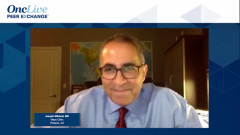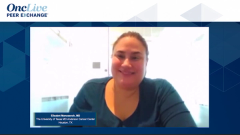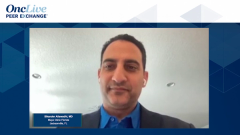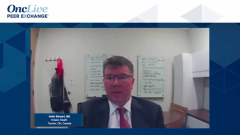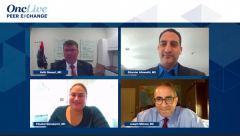
Clinical Trials in R/R Multiple Myeloma
Dr Joseph Mikhael and expert panel discuss key efficacy and safety outcomes of pivotal clinical trials evaluating treatment regimens in patients with R/R multiple myeloma.
Sponsored in part by Amgen Oncology and Sanofi. Content independently created by OncLive.
Transcript:
Joseph Mikhael, MD: Excellent. We have a lot of commonalities in thinking. And I will go through this in tremendous detail, but just to remind people, if you're going to get a category 1 designation in the NCCN [National Comprehensive Cancer Network] guidelines, it's usually driven by a phase 3 trial. And it’s remarkable how many phase 3 trials we have now. Keith led one of the first ones when we saw carfilzomib/lenalidomide and dexamethasone when we weren't using as much continuous lenalidomide in the maintenance setting. But now look. We have a proteasome inhibitor in carfilzomib phase 3 trials with the IKEMA and CANDOR studies. And as Elisabet noted, IKEMA has really shown quite an impressive progression-free survival.
But we also have the proteasome inhibitor using bortezomib with DVd [daratumumab, bortezomib, and dexamethasone] and the CASTOR study and most recently, with a totally new mechanism of action with selinexor with the BOSTON study.
We have a question here where someone asks if there is really a difference between a 17p deletion and a p53 mutation? I'm going to ask you, Keith, because I know that this may be relevant to selinexor in the mechanism of action of that drug as being an export inhibitor. Could you clarify a little bit about the difference between having 17p deleted and having a mutation in the p53 gene?
Keith Stewart, MD: Well, they have 2 copies of the gene. If one is deleted, which is what we test for with the FISH [fluorescence in situ hybridization] scale, that's usually a bad thing. But it turns out that if you do mutation tests, then you really need both to make yourself ultra-ultra-high risk. Most of us don't do p53 mutation testing, so it's a bit of a moot point. And in my opinion, any p53 deletion is bad. But clearly, I think one day we will be screening for mutation as well, and we probably should be.
Joseph Mikhael, MD: Yeah, I completely agree with you, I think the key message for the clinician is that p53 deletion independent of whether the mutation has been looked for, and detected, is an adverse prognostic marker. And then, as we've mentioned, and I know Keith made comments about travel, so we also have now the pomalidomide combinations with phase 3 studies with isatuximab/pomalidomide and dexamethasone [IsaPd], as well as daratumumab/pomalidomide and dexamethasone [DPd].
We've talked a little bit about this question, so I'm going to come back to the patient and remind ourselves when someone is relapsing, it is important for us to look at the big picture. I've often said myeloma is like a crime scene where 1 piece of evidence doesn't tell you the whole story, and when someone relapses like that, it is wise to get the whole picture, and in a particular, repeating the marrow for cytogenetics, because some of these things are acquired, most of the translocations are not going to be acquired per se, but we can see this p53 deletion as a new de novo abnormality. And so, it really does become important for us.
And I would also put a plug in here for the importance of advanced imaging. Myeloma, especially with subsequent relapses, has a greater preponderance towards extramedullary disease, and so we can end up being in a situation where what you see in the blood in the marrow may not tell you the full picture, and you're going to want to know if there's evidence of extramedullary disease because that is not only going to be a way to follow the patient, but it could cause more damage and organ toxicity to patients when we see that. And it also speaks of higher-risk diseases.
So, in this patient, we did see that there was a PET [positron emission tomography]/CT [computed tomography] done and the patient was treated with isatuximab, carfilzomib, and dexamethasone [IsaKd]. And why is that? And I'm not going to spend a lot of time on this, because this was recently updated. In the design of this study, back in the day, we were still giving carfilzomib twice weekly. Isatuximab is a CD38 [cluster of differentiation 38] antibody that's given once weekly for the first cycle, then every other week there afterward. And in this phase 3 study, there was a 3-to-2 design of 3 IsaKd vs 2 receiving Kd [carfilzomib/daratumumab]. And these patients, I would suggest, reflecting on what we're seeing in early relapse, we didn't have a large fraction, but there were around 10% of patients over the age of 75. Interestingly, also, as Elisabet noted, we have about 40% of people that have a 1q abnormality in this study, and we can see that about half of these patients have had 1 prior line of therapy. The study was involving patients with 1 to 3 prior lines, and the other half had had either 2 or 3 prior lines.
And this is probably the key result to leave with you. That when we had FDA censoring rules applied to the PFS [progression-free survival], notice that Kd alone gives a progression-free survival of 21 months, which is pretty impressive for a doublet. But look at how that is improved, literally doubled, to 41.7 months in IsaKd. And there are different ways to cut this, if we do it without the censoring rules, it's 36 months instead of 42 months, roughly. But nonetheless, we're seeing patients on this regimen with a 3-year progression-free survival, which is really impressive. And we see it pretty much across the board and all the subgroups as we would have anticipated. And although, as Sikander mentioned, it's not yet necessarily guiding our therapy, we are very careful to capture MRD [minimal residual disease] status, as it is a greater indication, obviously, of the depth of response.
Safety-wise, we have to be careful as every drug comes with risk. We saw that the safety findings here were, if you will, consistent with what we've seen in the interim analysis and consistent with using a CD38 antibody where there's an increased risk of infection, and using carfilzomib where there's an increased risk of cardiac issues. We do see here that the discontinuation rate was lower in the triplet arm than in the control arm. There was this ongoing signal, Keith first demonstrated this in the ASPIRE trial, with carfilzomib, lenalidomide, and dexamethasone, that there is a signal of about 4% to 5% cardiac failure of grade 3 or higher, and so this does have to be monitored in the early phases of an individual's treatment. And this follows nicely after what we had already seen before in the CANDOR study, which is a very similarly designed study, phase 3 looking at daratumumab, carfilzomib, dexamethasone vs. carfilzomib and dexamethasone, where there are some absolute differences, so we're careful not to compare across trials.
But again, we saw a near doubling of the progression-free survival, from 15 months to 29 months in patients who received daratumumab plus carfilzomib, dexamethasone vs carfilzomib and dexamethasone alone. And then lastly, which we had seen previously, typically in the United States, we're not using as much bortezomib in early relapse, but we saw, again, if you will, a doubling of progression free-survival and DVd vs Vd [bortezomib and dexamethasone]. Although I must say that we have not typically used this regimen as frequently, especially in the way that it's given by virtue of the fact that the bortezomib has stopped after 6 months. And I do think that, in general, here in the United States, we are seeking to have deeper and more durable responses with more continuous therapy that hopefully can be tolerated a little bit better.
Transcript edited for clarity.


